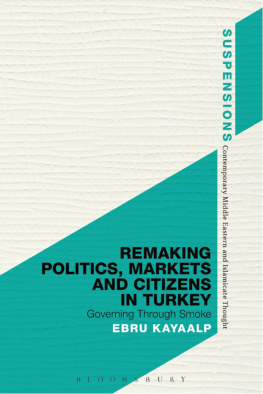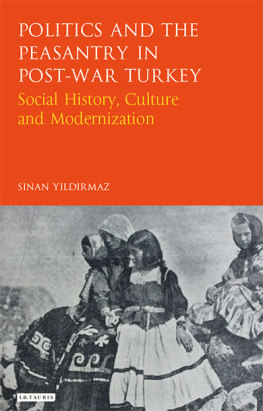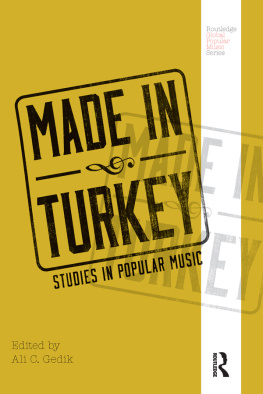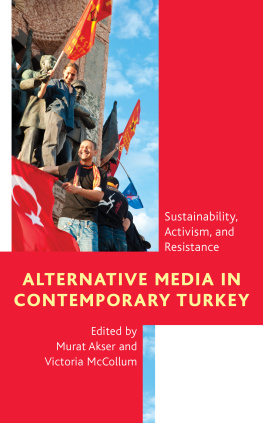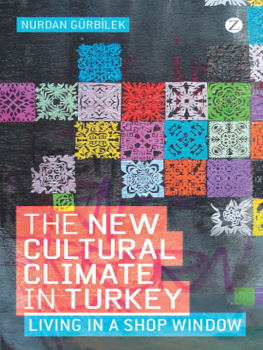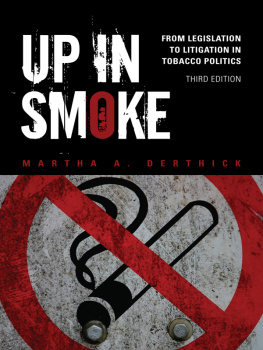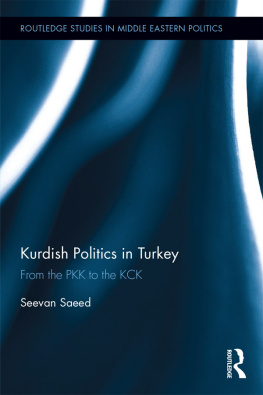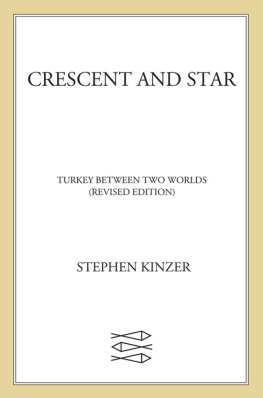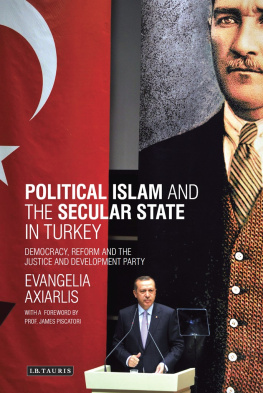Remaking Politics, Markets, and Citizens in Turkey
Suspensions: Contemporary Middle Eastern and Islamicate Thought
Series editors: Jason Mohaghegh and Lucian Stone
This series interrupts standardized discourses involving the Middle East and the Islamicate world by introducing creative and emerging ideas. The incisive works included in this series provide a counterpoint to the reigning canons of theory, theology, philosophy, literature, and criticism through investigations of vast experiential typologiessuch as violence, mourning, vulnerability, tension, and humorin light of contemporary Middle Eastern and Islamicate thought.
Iranian Identity and Cosmopolitanism, Lucian Stone
On the Arab Revolts and the Iranian Revolution, Arshin Adib-Moghaddam
The Politics of Writing Islam, Mahmut Mutman
The Writing of Violence in the Middle East, Jason Bahbak Mohaghegh
It would be impossible to name everyone who has helped me to produce this book. Yet there are a number of people who have remained particularly significant. The book grows out of research that I conducted for my doctoral dissertation at the Department of Rice Anthropology. My advisors, friends, and colleagues at Rice Anthropology have certainly played the most significant part in the formation of this book. I am deeply grateful to George Marcus and James Faubion for being endless sources of intellectual inspiration and guidance. I consider myself very lucky for the opportunity to have them as my mentors. My deepest gratitude also goes out to Chris Kelty who read and criticized a myriad of drafts, and provided much insightful feedback. I thank Hannah Landecker for her unfailing intellectual and moral support. She always shared my enthusiasm and became a constant source of motivation. I am also indebted to Stephen Tyler and Mahmoud Amin El-Gamal for their invaluable feedback in the early stages of this research.
The fieldwork and writing phases of the book took place in various locations. In Turkey, my greatest debt goes to the tobacco experts in zmir, Akhisar, Kiraz, Adyaman, Batman, Malatya, Sason, Diyarbakr, Ankara, Bafra, Samsun, and Istanbul, who opened their community to me and provided every possible facility to make my life easier in the field. My thanks also go out to the wonderful people in TEKEL, the Tobacco Regulatory Agency, tobacco leaf companies, multinational cigarette manufacturers, and tobacco farmers, who were so kind as to offer me their support.
I cannot emphasize enough the contributions of my friends to this book. In Houston, my friends Erkan Saka, Elitza Ranova, Nahal Naficy, Ayla Saml, Anthony Potoczniak, Valerie Olson, Katia Belousova, and Ertan Snmez provided emotional and intellectual support at crucial points of this project. In Istanbul, ala Diner, Asena Gnal, Elif Pars, and Didem Dan were always with me through their unending expressions of friendship and belief in my research. In Ankara and zmir, I want to thank my friends Gnl nal and Ebru Baydar for opening their hearts and homes to me. In New York, I offer my heartfelt thanks to Asl Peker for years of friendship, support, and intellectual inspiration. I want to thank Katayoun Shafiee for sharing her knowledge and friendship with me. I am also grateful to Janet Roitman for her thoughtful insights, comments, and criticisms on one of my chapters.
I was extremely fortunate to receive generous financial support at all stages of researching and writing process. I wish to thank the Social Science Research Council (through two grants), the American Research Institute in Turkey and the Rice University for generously supporting my research and writing. Thanks are due also to the Department of Politics at New York University, where much of this book was revised by the grant provided by the Scientific and Technological Research Council of Turkey. I am grateful to these institutions for making this book possible.
A different version of was published in Turkish in Toplum ve Bilim, 124 (2012): 16584, with the title, Piyasann Snrlar: Yeni bir Ttn Piyasas Nasl Kurulur? I am grateful to these journals for permission to reprint these essays here.
This book took its final shape during the years that I spent as an assistant professor at Istanbul ehir University, Turkey. At ehir, I have been blessed to find a community of friends who enthusiastically gave me invaluable assistance and encouragement. I would especially like to thank Fatih Altu, Fahrettin Altun, Canan Balan, mit Cizre, Peyami elikcan, Asl Telli, Fatih Uslu, and Zeynep Merve Uygun. I am particularly indebted to Mahmut Mutman for his unflagging support from the beginning to the end of the writing process. I am very fortunate to have the help of Eylem Akay, Alba Brunetti, Will Day, Baran Karsak, Derya Jurich, Oya Pars, and Aye Ylmaz, who supplied enormous assistance when I was writing the book. I am also grateful to my editors, Jason Bahbak Mohaghegh and Lucian Stone, whose comments and attention have enriched this book deeply.
I could have accomplished nothing without the patience and love of my parents, Turan and Perihan Kayaalp. My brother Cneyt and his wife Firdevs Kayaalp were always with me, selflessly providing practical support and constant motivation. My deepest gratitude goes to Jack Jurich, who listened to, read, and edited this book countless times. I am thankful to him for his care, encouragement, and love, and moreover, for the pleasure of life beyond work. I dedicate this book to my daughter, Zeynep Thalia, who was with me all the time on this journey.
It was the first week of my temporary work at the Tobacco Experts Association in zmir. I was spending all my time there, carrying out archival research, working on the tobacco experts grant application to the European Union, and hosting visitors to the Associations small apartment in the center of town. I was extremely careful about everything. Mostly sitting at the desk reserved for me, I spent much time trying to figure out what would be the right time to ask questions, join in the conversation, or even go to the kitchen to have another cup of tea. This overly controlled life was upsetting. Although I knew it was a temporary situation, it was quite exhausting to be so self-conscious all the time. I wondered if my paranoid state of mind stemmed simply from the anxiety of being in the field for a while, or originated from a sense of my interlocutors possible doubts about my research. In any case, I knew that something big was coming.
One morning, my boss Ahmet Bey, who helped me to secure the position at the Association, came into the office and closed the door behind him in a serious manner. I had learned by experience that when the door was closed, the experts would talk about politics, and in the first days, I was always left out. But this time, the door was closed for me, and in his quick and straightforward way, Ahmet Bey practically spat the words out:
AB: I know it is not true. But there is a rumour among the experts that you might have been sent by the CIA.
EK: Me? A CIA agent? And I was sent for what? To check the tobacco quality of Turkey? To secretly smuggle tobacco leaves to the US? To provide them with information about the cultivation of tobacco produced in Turkey?
I could not help but to burst into laughter. It was too sudden, too unexpected, and too ridiculous. I thought it was a joke, but it was not. Ahmet Bey, although assuring me that he did not believe the rumors, was not smiling at all.

